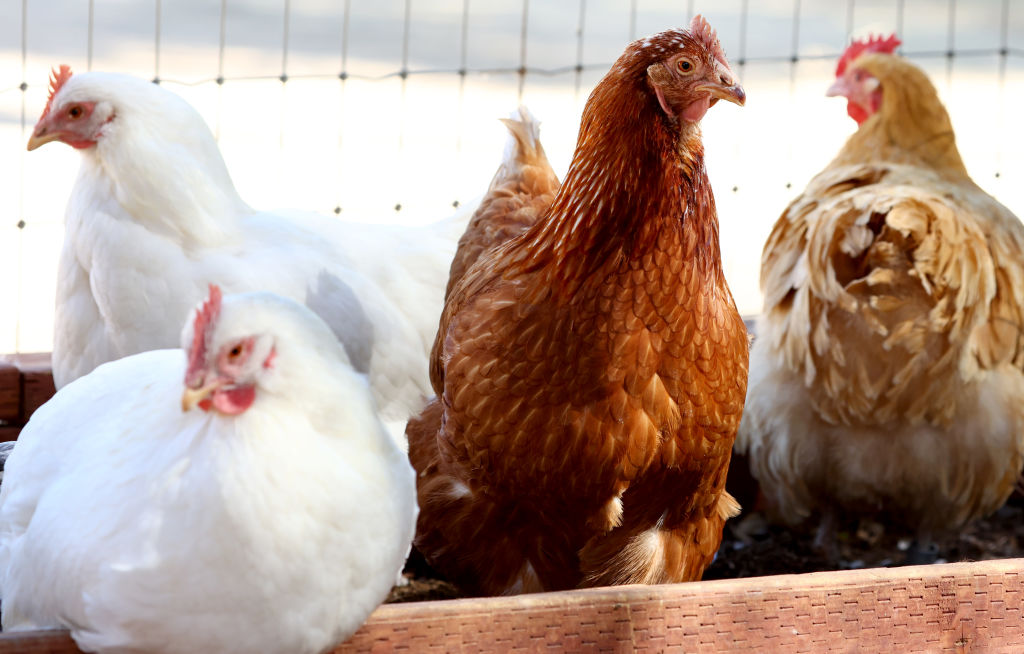


Texas families should be allowed to keep chickens in their yards and gas stoves in their kitchens, according to Texas politicians.
And several Texas legislators have introduced bills to that effect during the 2023 Texas legislative session.
The bills are in response to the high price of chicken and eggs, exacerbated by inflation and a bird flu epidemic that ravaged the population last year.
It’s also evidence of feathers ruffled by the Biden administration’s war on oil and gas, one they’ve suggested could extend to banning gas stoves.
The chicken bill has bipartisan support, suggesting it could fly through the Texas Legislature. Four similar bills were filed by Democrat Rep. Philip Cortez, and three Republicans—Sen. Bob Hall, Rep. Brisco Cain, and Rep. Brooks Landgraf.
The bills introduced by Landgraf and Cortez are more expansive—allowing for other fowl, rabbits, and plots for fruits and vegetables—much like the victory gardens tended during the World War II era by Americans determined to grow their own food.Toth said
Rep. Steve Toth, a Republican, filed the Home Range Defense Act as a “preemptive legislative strike” against any attempt by the Biden administration to stop Texans from cooking on gas stoves.
HB 1414 would declare Texas a sanctuary state for “seniors, chefs, hobbyist cooks, and parents, who rely on gas stove technology to prepare their meals,” Toth said in a written statement.
His bill would prohibit state agencies from enforcing federal regulations against gas stoves, thus preserving them for use in the Lone Star State.
Toth believes President Joe Biden is fixated on turning everything electric, he told The Epoch Times.
Toth said Biden opposes natural gas and oil. He promotes green energy, which proponents say is cleaner, to fuel electric cars and produce electricity for the nation’s power grids.
Controversy over gas stoves flared after the U.S. Consumer Product Safety Commission (CPSC) suggested banning gas stoves in January, claiming they are hazardous and pollute the air inside homes.
“We have a message for any D.C. insider trying to stop us from using gas stoves: ‘Come and Take ‘Em!'” Toth said.
Texas lawmakers want to give city and suburban folks something to crow about when putting food on the table.
The chicken bills would have similar provisions, allowing up to six chickens or fowl in the side or back yards of single-family residences.
State Sen. Hall told The Epoch Times that chicken bills similar to his SB 326 were filed in past legislative sessions. Support never took off.
But now prices for eggs and chicken have soared since the bird flu wiped out 52.7 million chickens. A string of fires at commercial chicken coops exacerbated the problem, killing tens of thousands more birds last year.
Chickens are one of the “least offensive” animals people can raise to provide food for their families, Hall said. The bills would mainly affect the suburbs and urban areas, where cities often regulate which animals can be kept in yards.
His SB 326 would not overrule regulations limiting chickens in neighborhoods governed by homeowners associations—organizations that set rules for neighborhoods for details such as allowable roofing materials, fencing varieties, and animals.
This may be the year of the chicken as concerns about food security grow, Cain told The Epoch Times.
Cain’s HB 1191 mirrors Hall’s bill, which allows urban families to keep chickens—but gives cities the ability to regulate them, such as prohibiting roosters and requiring coops to be a certain distance from neighboring yards.
“We’ve been trying to do these things for a while to create the ability for people to be independent,” Cain said. “The timing seems to be better now.”
The other chicken bills introduced by Landgraf and Cortez advocate for a broader range of food production by allowing up to six fowl and six rabbits, but no more than a total of eight animals. Those measures also would allow for fruit trees and gardens.
Under the bills, cities and counties could regulate such things as placement and type of materials used for coops, the size of coops, and the upkeep of gardens and fruit trees.
Cortez’s HB 276 would allow energy production at a family residence, too. Families could install solar or wind-powered energy devices and rainwater harvesting systems.
But consumers would need to weigh the cost of producing their own food, such as chickens.
At a website called Chicken Coop Design Plans, do-it-yourselfers can estimate start-up expenses, such as building a coop. They can also calculate the ongoing costs of providing feed and care.
Chickens can cost anywhere from $3 to $30 per chicken, depending on the breed.
Young chicks cost as little as a few dollars each but require specialized equipment such as a heat lamp and brood box. Starting with babies can add $100 to the cost.
It’s easier to buy 4-week-old chicks that need less care, chicken experts suggest.
A Rhode Island red, a popular breed for backyard chicken enthusiasts, may cost about $17 at four weeks of age.
Experienced chicken raisers advise that the least expensive way to get a coop is to build one from recycled materials or wood from a big-box hardware store.
Readymade chicken housing at farm supply stores can cost $600 for a basic model. Luxurious digs designed to keep birds from flying the coop can go for $4,000.
Chicken feed costs about $15 per month per chicken. Bedding, such as wood shavings or shredded newspaper, can add $10 per month to expenses.
Depending on the breed, some hens only lay eggs for three-to-four years. Four adults can produce a dozen eggs or more each week.
In Texas, the cost to buy a dozen eggs is about $4.50.



